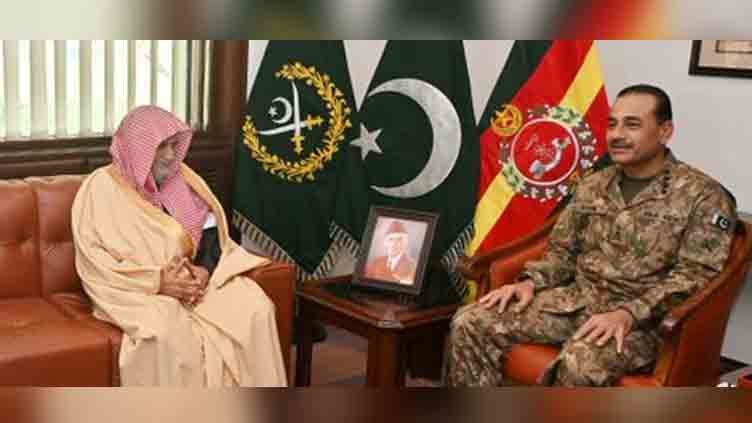RAWALPINDI: Today, a momentous gathering unfolded at General Headquarters, where His Excellency Sheikh Saleh bin Abdullah bin Muhammad Humaid, the esteemed Imam-e-Kaaba, met with General Syed Asim Munir, NI (M), Chief of Army Staff (COAS).
The discussions delved into various matters of shared interest, with COAS extending a hearty welcome, recognizing the profound honor bestowed upon Pakistan by the visit of H.E. Imam-e-Kaaba.
During the meeting, COAS emphasized the universal reverence Muslims hold for the sacred Harmain Sharifain and their revered custodian.
H.E. Imam-e-Kaaba echoed these sentiments, portraying Islam as a religion of peace and brotherhood. Underscoring the absence of room for misinterpretations within the faith.
Addressing global concerns, both dignitaries jointly condemned the ongoing atrocities in the Gaza conflict and the oppression faced by Muslims in IIOJK.
READ MORE: Peshawar: Online hearing facility for prisoners inaugurated in Central Jail
Imam-e-Kaaba and COAS discuss Unity and solidarity expressed with the people of Palestine and Kashmir. General Munir underscored the robust strategic relations between Pakistan and the Kingdom of Saudi Arabia.
Emphasizing their foundation in historic religious and cultural ties, as well as the profound respect and affection that Saudi Arabia holds in the hearts of Pakistanis.
Both leaders acknowledged the unanimity of views between the two brotherly nations. In conclusion, H.E. Imam-e-Kaaba offered prayers for the peace, stability, and unity of the Ummah. Marking the conclusion of this significant meeting between the spiritual leader and the military chief. Imam-e-Kaaba and COAS discuss Unity.
It is pertinent to note that the deep-rooted relations between Saudi Arabia and Pakistan thrive on historic religious and cultural bonds.
Regular visits by esteemed scholars, such as the revered Imam-e-Kaaba, serve as a testament to the strength of this brotherhood.
These encounters foster unity and mutual understanding. Reinforcing the shared values and respect that underpin the strategic alliance between the two nations.
The visits by holy scholars not only signify spiritual connections but also contribute to diplomatic, cultural, and strategic cooperation.


